Ghent University
Ghent University (Dutch: Universiteit Gent, abbreviated as UGent) is a public research university located in Ghent, Belgium. It was established in 1817 by King William I of the Netherlands. After the Belgian revolution of 1830, the newly formed Belgian state began to administer the university. In 1930, the university became the first Dutch-speaking university in Belgium, whereas French had previously been the standard academic language in what was Université de Gand. In 1991, it was granted major autonomy and changed its name accordingly from State University of Ghent (Dutch: Rijksuniversiteit Gent, abbreviated as RUG) to its current designation.
Universiteit Gent | |
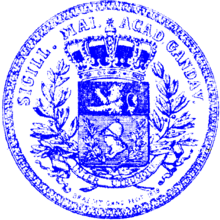 Seal of Ghent University | |
| Latin: Academia Gandavensis | |
Former names | State University of Ghent |
|---|---|
| Motto | Inter Utrumque (Latin) |
Motto in English | In Between Both |
| Type | Public |
| Established | 1817 |
| Rector | Rik Van de Walle |
Administrative staff | 9,000 |
| Students | +44,000 |
| Location | , |
| Campus | University town |
| Colours | UGent corporate blue & White [1] |
| Affiliations | CESAER Erasmus Student Network European University Association Guild of European Research-Intensive Universities Santander Network |
| Website | www |
 | |
In contrast to the Catholic University of Leuven or the Free University of Brussels, UGent considers itself a pluralist university in a special sense, i.e. not connected to any particular religion or political ideology. Its motto Inter Utrumque ('In Between Both Extremes'), on the coat of arms, suggests the acquisition of wisdom and science comes only in an atmosphere of peace, when the institution is fully supported by the monarchy and fatherland.
Ghent University is one of the biggest Flemish universities, consisting of 44,000 students and 9,000 staff members. The University also supports the University Library and the University Hospital, which is one of the largest hospitals in Belgium. It is one of the greatest beneficiaries of funding from the Research Foundation - Flanders (FWO). Ghent University consistently rates among the top 100 universities in the world .
History
Foundation, in the 19th century
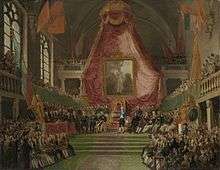
The university in Ghent was opened on October 9, 1817, with JC van Rotterdam serving as the first rector. In the first year, it had 190 students and 16 professors. The original four faculties consisted of Humanities (Letters), Law, Medicine and Science, and the language of instruction was Latin. The university was founded by King William I as part of a policy to stem the intellectual and academic lag in the southern part of the United Kingdom of the Netherlands, later to become Belgium.
After peaking at a student population of 414, the number of students declined quickly following the Belgian Revolution. At this time, the Faculties of Humanities and Science were broken from the university, but they were restored five years later, in 1835. Ghent University played a role in the foundation of modern organic chemistry. Friedrich August Kekulé (7 September 1829 – 13 July 1896) unraveled the structure of benzene at Ghent and Adolf von Baeyer (Johann Friedrich Wilhelm Adolf von Baeyer), a student of August Kekulé, made contributions to organic chemistry.
In 1882, Sidonie Verhelst became the first female student at the university.
French became the language of instruction, taking the place of Latin, after the 1830 Revolution. In 1903, the Flemish politician Lodewijk De Raet led a successful campaign to begin instruction in Dutch, and the first courses were begun in 1906.
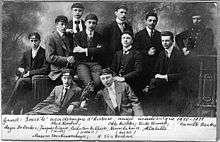
Developments since the 20th century
During World War I, the occupying German administration conducted Flamenpolitik and turned Ghent University into the first Dutch-speaking university in Belgium. A Flemish Institute (Vlaemsche Hoogeschool), commonly known as Von Bissing University, was founded in 1916 but was disestablished after the war and French language was fully reinstated. In 1923, Cabinet Minister Pierre Nolf put forward a motion to definitively establish the university as a Dutch-speaking university, and this was realized in 1930. August Vermeylen served as the first rector of a Dutch-language university in Belgium.[2]
In the Second World War, the German administration of the university attempted to create a German orientation, removing faculty members and installing loyal activists.
After the war, the university became a much larger institution, following government policy of democratizing higher education in Flanders during the 1950s and 1960s. By 1953, there were more than 3,000 students, and by 1969 more than 11,500. The number of faculties increased to eleven, starting with Applied Sciences in 1957. It was followed by Economics and Veterinary Medicine in 1968, Psychology and Pedagogy, as well as Bioengineering, in 1969, and Pharmaceutical Sciences. The faculty of Politics and Social Sciences is the most recent addition, in 1992. In the 1960s to 1980s, there were several student demonstrations at Ghent University, notably around the Blandijn site, which houses the Faculty of Arts & Philosophy.[3] The severest demonstrations took place in 1969 in the wake of May 1968.
In 1991, the university officially changed its name from Rijksuniversiteit Gent (RUG) to Universiteit Gent (UGent), following an increased grant of autonomy by the government of the Flemish Community.
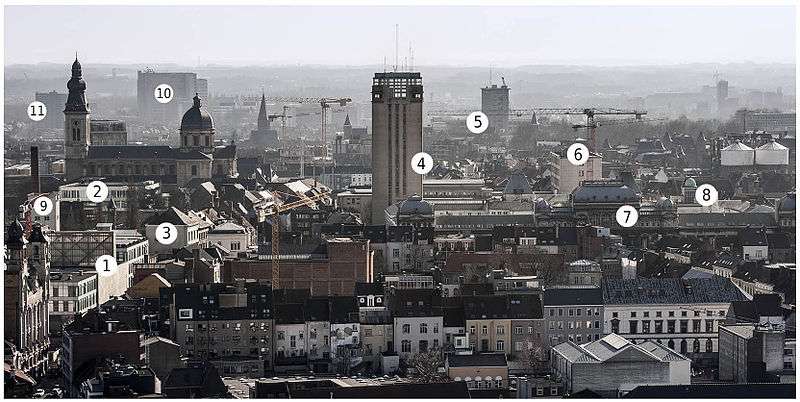
Academic Profile
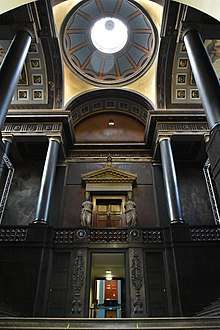
Organisation and structure
Ghent University consists of eleven Faculties with over 130 individual departments. In addition, the university maintains the Zwijnaarde science park and Greenbridge science park.
List of faculties
- Faculty of Arts and Philosophy[4]
- Faculty of Bio-science Engineering[5]
- Faculty of Law[6]
- Faculty of Sciences[7]
- Faculty of Medicine and Health Sciences[8]
- Faculty of Engineering and Architecture[9]
- Faculty of Economics and Business Administration[10]
- Faculty of Veterinary Medicine[11]
- Faculty of Psychology and Educational Sciences[12]
- Faculty of Pharmaceutical Sciences[13]
- Faculty of Political and Social Sciences[14]
Library
Standing on the Blandijnberg, the Boekentoren houses the Ghent University Library, which contains nearly 3 million volumes. The University Library has joined the Google Books Library Project. Among other notable collections, it preserves Papyrus 30, an early manuscript of the Greek New Testament.
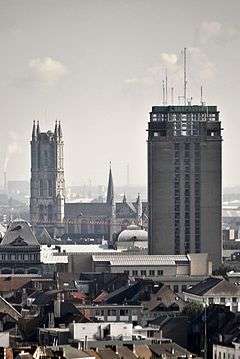
Reputation & rankings
| University rankings | |
|---|---|
| Global – Overall | |
| ARWU World[15] | 66 (2019) |
| CWTS World[16] | 61 (2019) |
| THE World[17] | 123 (2020) |
| USNWR Global[18] | 87 (2020) |
| QS World[19] | 120 (2020) |
Ghent University consistently ranks among the best 100 universities in the world. In 2017, it was ranked, globally, 69th by the Academic Ranking of World Universities (or Shanghai ranking)[20] and 125th by QS World University Rankings.[21] For 2018, Ghent University has been ranked, worldwide, 88th by U.S. News & World Report[22] and 107th by Times Higher Education.[23]
International relations
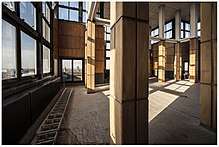
The university maintains many partnerships within Belgium, across Europe, and throughout the world. For instance, Ghent University supports the Belgian Co-ordinated Collections of Micro-organisms and the Vlaams Instituut voor Biotechnologie. Within Europe, it is a member of the Santander Network and the U4 Network. It also participates in the Conference of European Schools for Advanced Engineering Education and Research. In addition, the University cooperates with numerous universities for the Erasmus and Erasmus Mundus programs; within the framework of the latter, it heads the International Master of Science in Rural Development and the International Master of Science in Soils and Global Change (IMSOGLO).[24]
Outside of Europe, Ghent University conducts exchange programs on all six continents.[25]
Gallery
- Rommelaere Instituut
- Law School
- Rectorate
- Botanical garden
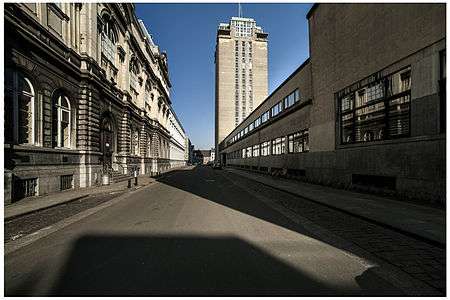 The Boekentoren, designed by Henry van de Velde, is one of the most famous university buildings
The Boekentoren, designed by Henry van de Velde, is one of the most famous university buildings- The Technicum, or Faculty of Engineering
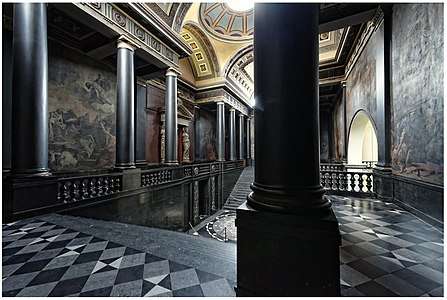 Aula Academica
Aula Academica- Faculty of Bioengineering
- The Blandijn houses the Faculty of Letters and Philosophy
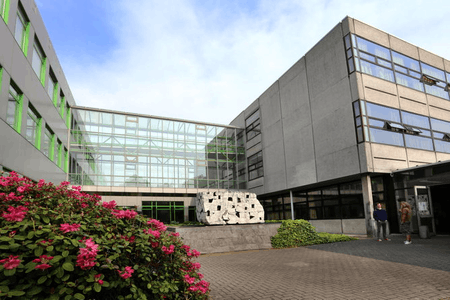 UGent Campus in Kortrijk
UGent Campus in Kortrijk- Faculty of Psychology
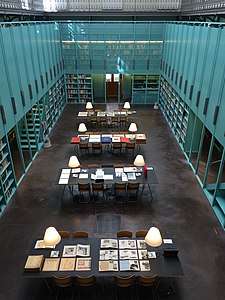 Library of the department of Architecture and Urbanism
Library of the department of Architecture and Urbanism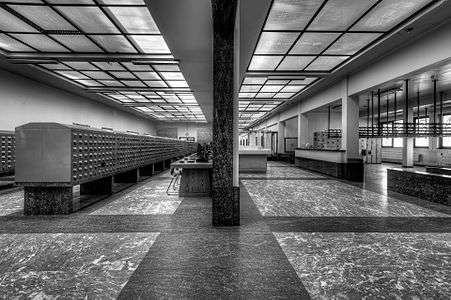 Boekentoren
Boekentoren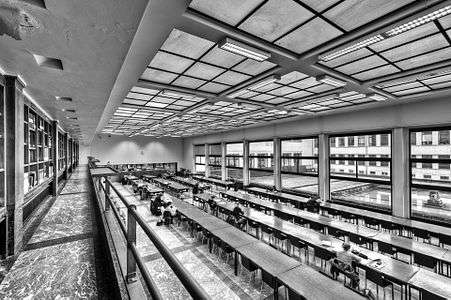 UGent Boekentoren
UGent Boekentoren Library of the Humanities Faculty
Library of the Humanities Faculty- Museum of Zoology
- Institute for Anatomy
People
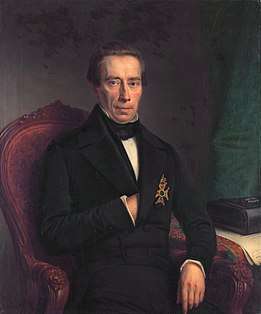 Johan Rudolf Thorbecke, statesman
Johan Rudolf Thorbecke, statesman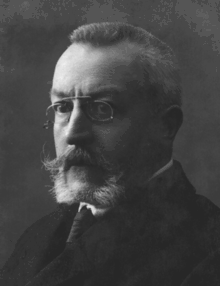 Henri Pirenne, historian
Henri Pirenne, historian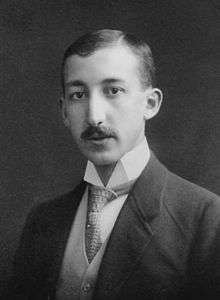 George de Hevesy, Nobel Prize winner in Chemistry
George de Hevesy, Nobel Prize winner in Chemistry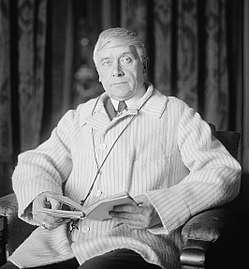 Maurice Maeterlinck, Nobel Prize winner in Literature
Maurice Maeterlinck, Nobel Prize winner in Literature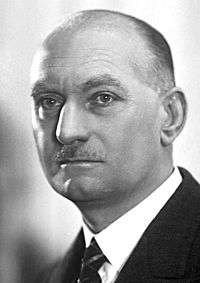 Corneille Heymans, Nobel Prize winner in Medicine
Corneille Heymans, Nobel Prize winner in Medicine._Minister_M._De_Riemaecker-Legot_opent_conferentie.jpg) Marguerite Legot, first female government minister in Belgium
Marguerite Legot, first female government minister in Belgium Yaakov Dori, president of the Technion, Haifa
Yaakov Dori, president of the Technion, Haifa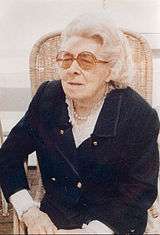 Suzanne Lilar, feminist writer
Suzanne Lilar, feminist writer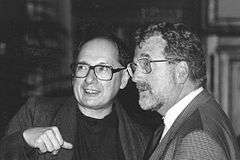 Jozef Schell (right), molecular biologist
Jozef Schell (right), molecular biologist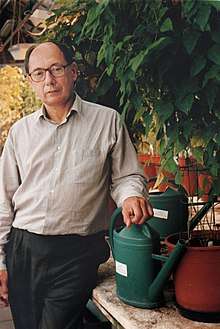 Marc van Montagu, molecular biologist
Marc van Montagu, molecular biologist Robert Cailliau, co-inventor of the World Wide Web
Robert Cailliau, co-inventor of the World Wide Web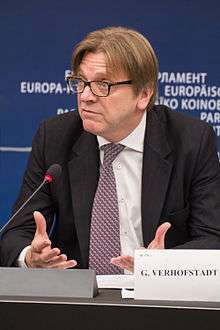 Guy Verhofstadt, politician
Guy Verhofstadt, politician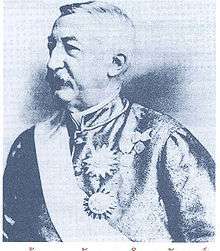 Gustave Rolin-Jaequemyns, jurist and diplomat
Gustave Rolin-Jaequemyns, jurist and diplomat
Notable alumni
|
|
|
Notable faculty
- S.N. Balagangadhara (born 1952), comparative science of cultures
- George de Hevesy (1885–1966), Nobel Prize winner, Chemistry
- François Laurent (1810–1887), historian and jurisconsult
- Jan De Maeseneer (born 1952), medicine, family medicine
- Georges De Moor (born 1953), medicine, medical informatics
- Walter Fiers (born 1931), molecular biologist
- Corneille Heymans (1892–1968), physiologist (Nobel prize winner)
- Joseph Plateau (1801–1883), physicist
- Xavier Saelens (born 1965), biotechnology
- Jeff Schell (1935–2003), biotech pioneer
- Erwin Schrödinger (1887–1961), physicist (Nobel Prize winner), visiting scholar
- Johan Rudolf Thorbecke (1798–1872), statesman
- Marc Van Montagu (born 1933), biotech pioneer
- August Vermeylen (1872–1945), author, art historian, statesman
- Adolf von Baeyer (1835–1917), chemist (Nobel prize winner), visiting scholar
- August Kekulé (1829–1896), chemist
List of rectors
|
|
|
See also
- Associatie Universiteit Gent
- Belgian Co-ordinated Collections of Micro-organisms (BCCM)
- Flanders Interuniversity Institute of Biotechnology (VIB)
- Ghent Bio-Energy Valley
- Ghent University Hospital (UZ Gent)
- Greenbridge science park
- Interuniversity Microelectronics Centre (IMEC)
- Open access in Belgium
- Science and technology in Flanders
- University Foundation
- Zwijnaarde science park
- List of modern universities in Europe (1801–1945)
- List of universities in Belgium
Notes and references
- Basic principles: Corporate colours – website of the UGent
- A Language Come Back, TIME Magazine, April 28, 1923
- Danniau, Fien. "Haard van verzet" (in Dutch). UGent Memorie. Retrieved January 10, 2012.
- Vervaeke, Ann. "Faculteit Letteren en Wijsbegeerte – Faculteit Letteren en Wijsbegeerte".
- Vervaeke, Ann. "Faculteit Letteren en Wijsbegeerte – Faculteit Letteren en Wijsbegeerte".
- "Archived copy". Archived from the original on 2013-04-06. Retrieved 2013-04-06.CS1 maint: archived copy as title (link)
- "Faculty of Sciences — Ghent University".
- "Faculteit Geneeskunde en Gezondheidswetenschappen — Universiteit Gent".
- "Faculty of Engineering and Architecture — Ghent University".
- "Archived copy". Archived from the original on 2013-04-03. Retrieved 2013-04-06.CS1 maint: archived copy as title (link)
- "Faculty of Veterinary Medicine — Ghent University".
- "Faculteit Psychologie en Pedagoghische Wetenschappen (FPPW)".
- "Faculty of Pharmaceutical Sciences — Ghent University".
- "Faculty of Political and Social Sciences — Ghent University".
- "Academic Ranking of World Universities 2019". ShanghaiRanking. Retrieved 2019-08-17.
- "CWTS Leiden Ranking 2019". ). Retrieved 2019-09-23.
- "World University Rankings 2020 - Ghent University". Times Higher Education (THE). Retrieved 2019-09-22.
- "Best Global Universities 2020". U.S. News Education. Retrieved 2019-11-21.
- "QS World University Rankings 2020". QS Top Universities. 5 June 2019. Retrieved 2019-07-15.
- "Shanghai Ranking 2017 Results".
- "QS Top Universities Ranking 2014–2015". 16 July 2015.
- "Best Global Universities 2018".
- "The Times Higher Education World University Rankings 2014–2015". timeshighereducation.com. 17 April 2020.
- "Home". IMSOGLO. Retrieved 2019-02-20.
- "Bestemmingen — Studentenportaal — Universiteit Gent". ugent.be.
- "Daskalidès, Jean (1922–1992) | UGentMemorie". Ugentmemorie.be. 16 August 2010. Retrieved 2013-10-15.
